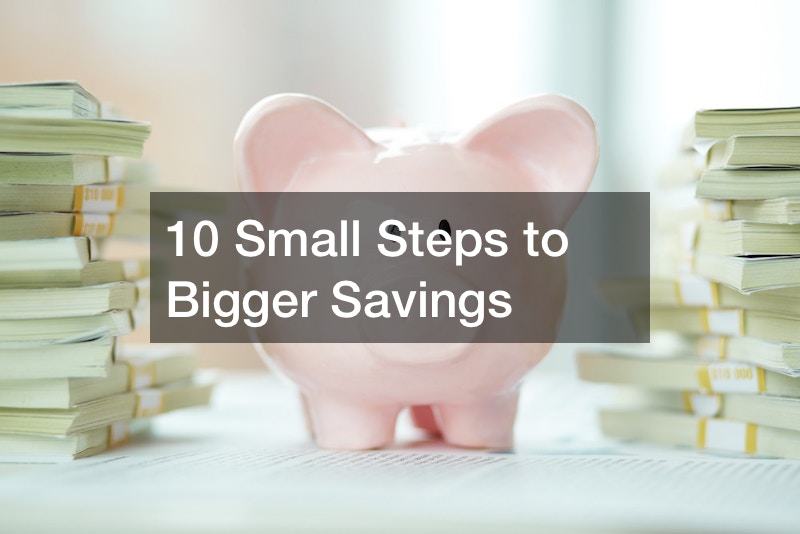
Saving money is something we can all benefit from. But the fact is, it takes time to find the motivation to start small and work our way up to a more significant savings goal. That’s why setting small steps that lead to a larger goal are so necessary. They give us something accessible and achievable to focus on right away.
Taking these small measures can help make saving more accessible and more effective. Whether you’re trying to save for retirement, emergency funds, a vacation, or even something fun like a new television – taking these small steps can go a long way in helping you reach bigger savings goals!
If you’re ready to start taking small steps to bigger savings, here are some excellent ways that you can get started on your savings journey today:
Seek Medical Benefits:
Medical bills can quickly become a source of stress and frustration for many. Without careful monitoring, medical billing can get out of control before you know it. This often leads to higher medical costs for the individual and can even put them into debt. To avoid this, making the most of your medical benefits is essential. Start by learning about your insurance plans, understanding what is covered and what isn’t, reading over bills thoroughly, and challenging any charges that need to be corrected.
Speaking with your employer about available benefits is a great way to start, as they may have additional medical help you can leverage at a discount. A discount on benefits is an even better version of the small steps to bigger savings.
It’s also important to contact your healthcare provider regarding medication changes and ask questions about every procedure or service charged on the bill to ensure you are not overcharged. Lastly, taking advantage of programs like discounts on prescription drugs and preventative care can help you save money in the long run. By doing these steps, you will be better prepared not only medically but financially as well.
Keep a Budget:

Sticking to a budget is essential for maintaining financial stability. Knowing exactly how much money you have, where it’s going, and what goals you’re trying to achieve are all crucial steps in budgeting. Fortunately, the internet provides many tools you can use to help manage your finances. Setting up an account updater on your banking app is a great way to keep track of incoming and outgoing expenses.
A budget will help you see where you could be spending extra money, such as dining out too frequently or making impulse purchases. Once you have identified where extra money is going, cutting out those expenses and reallocating it to savings can be a great way to help your finances.
If you’re not sure where to even begin making a budget, there’s no need to worry – online calculators and specialty apps make it easy to set realistic goals and budgets! A budget is usually one of the first small steps to more significant savings, as you can see how much money you could free up in a month.
Additionally, setting up automatic savings transfers can be incredibly useful in keeping yourself accountable and building a long-term financial plan. Many banks will let you automatically withdraw 10% into your savings account each time you are paid to make savings easier. With these helpful tools and conscious spending habits, you can keep better track of where you can save.
Trade in Your Old Electronics:
Getting cash for electronics can be a great way to save money on items you need. Since technology is ever-evolving, regularly trading in your old electronics can help you stay up-to-date with the newest products without breaking the bank.
Electronics trade-in programs are a commonly overlooked area where people can save money, and it’s a great one of the small steps to bigger savings.
Not only will you be able to get some of your old devices off your hands and maybe even make a bit of money from them, but you’ll also have access to new products and features that would otherwise cost more. Additionally, trading in these products can often result in discounts on the products or services you need or want if you take this route; however, research which stores offer the most competitive buyback rates to get the best value for your trade-ins!
Cancel Your Unused Subscription Services:

Canceling unused subscriptions can be a great way to free up some extra money every month. These could be anything from streaming services you signed up for but no longer use to magazine subscriptions you haven’t read in months. Taking the time to review your active subscriptions and canceling any that are no longer necessary is an easy way to keep more money in your pocket each month.
If you can cancel three subscriptions worth $10 each a month, this could represent small savings that would add up to an extra $360 per year. If you have subscriptions worth more, you could quickly unlock quite a lot of additional cash flow that could be redirected into savings.
When performing your budget in small steps to bigger savings, total up the cost of all your subscriptions, and you might be surprised how much a month you are paying!
Choose a Good Used Car Over a New One:
Rather than buying a brand new car, it is often advantageous to get a reliable used one instead. As part of this, one of the small steps to more significant savings, going to a car dealership with a carfax or another service to verify a used car history, such as a manufacturer-approved used car program, can be beneficial.
When it comes to used cars, the most crucial factor is typically the car’s condition; you want to ensure that it runs well and has no significant issues. Researching a particular model or make and getting an independent mechanic to look at the car before signing off on any paperwork can help you avoid getting a lemon. Although the financing rates on used cars are often higher than a new car, you can save money the cost significantly and even more if you can give the car dealership a cash offer.
Comparison Shop Online:
Comparison shopping online will help you save on almost every product you buy. Rather than impulse purchasing, take the time to look around and compare prices, features, and value at different retailers.
The internet is full of resources that can give you more information on a product or service than you could ever find in the store. Use price-comparison or price-tracking websites as one of the best small steps to bigger savings. Wait to purchase until a product goes on sale for the best protection.
Comparison shopping online is essential for consumers regarding medical equipment supplier products. With so many different products and suppliers to choose from, comparing price points and quality before making a purchase is vital in ensuring you’re getting the best value for your money.
Rather than relying on medical stores at clinics, comparison shopping allows you to review different online retailers and their offerings without ever having to leave the comfort of your home.
Pay Off High-Interest Debts:
When considering debt consolidation, paying off your highest-interest debts first is wise. By focusing on eliminating the debt with the highest rate of interest, you will reduce your overall debt more quickly and save yourself money in the long run. Additionally, lower interest rates may help you significantly reduce your monthly payments while paying off your debt sooner. Debt consolidation loans can be one of the best small steps to bigger savings because you will save on long-term interest costs and free up funds for savings.
Going to a debt consolidation specialist could help you to negotiate your debts, reducing the total amount you owe and lowering your interest rates. This can be a great way to reduce monthly payments and improve cash flow.
Update Your Homeowners Insurance:

Updating your homeowner’s insurance policy is essential in ensuring you get the most bang for your buck. It is vital to periodically review your policy and assess whether it meets your current needs. If there have been any changes to your property since you first purchased your policy, you may get a reduced rate by updating it.
For instance, if you have added features such as storm windows or security systems, these updates can help you qualify for discounts on premiums. Additionally, keep an eye out for new policies offering lower prices coverage. You may also be able to follow the small steps to bigger savings by calling your insurance company to bundle car and homeowner’s insurance for a discount.
Research Help with Insurance:
If you have any open insurance claims yet to receive a settlement, it may be beneficial to research help with insurance. Many organizations specialize in helping people obtain the coverage they need and can guide you through filing a claim. Having an advocate on your side when dealing with insurance companies can save you time, stress, and money. Some of these organizations offer free services or assistance for low-income households.
Although these services may take a percentage of what you are owed, speaking to an insurance claim lawyer or medicare insurance consulting could wipe out a significant portion of your debt. With the funds awarded from insurance claims, you can take small steps to bigger savings and use them to invest in your future.
It is worth researching advocates and other assistance programs when filing a claim. It could help you save on out-of-pocket costs or increase coverage more than you had initially anticipated. Researching different insurance companies to determine which one offers the best value for your needs is also a small step to bigger savings.
Sell Your Extra Valuables:
Clutter in your home could be something that you could turn into cash. The items you have been storing could be sold to make some extra money. Selling old clothing, furniture, and electronics can provide you with the funds necessary to invest in your future. It could also help eliminate stress from clutter around your home or apartment. You can even take advantage of online sites like eBay, Etsy, or Poshmark to sell used items for a profit.
If you are interested in getting quick cash for items you don’t need, you could look at scrap yards that pay cash for junk cars or go to a pawn shop. These are fast ways to get some money for things that are not needed, which you could direct to help with your finances. A pawn shop or scrap yard is often a place to go for quick cash, so it is usually advisable to seek a private sale on the items you don’t need to get the best possible value for them.
Bonus: Seek a Financial Advisor:
If you’re serious about taking small steps to bigger savings, seeking a financial advisor can be very beneficial. A financial advisor can help you develop strategies for budgeting and investing to reach your long-term goals.
Working with an advisor is an excellent way you can formulate a plan for your future and work towards a specific goal you might have for your finances. Financial advisors work on commission as a portion of your portfolio value. It is usually best to consider this option when you have savings goals that are more complex or when you are comfortable with the amount of money that you have saved.
Conclusion:
Taking small steps to bigger savings can be a simple and efficient way to increase your financial stability. You can assess your current insurance policy and look for ways to save on premiums, research help with insurance options, sell extra valuables, and even seek a financial advisor. With discipline and determination, you can put yourself on the path to achieving your long-term financial goals.



